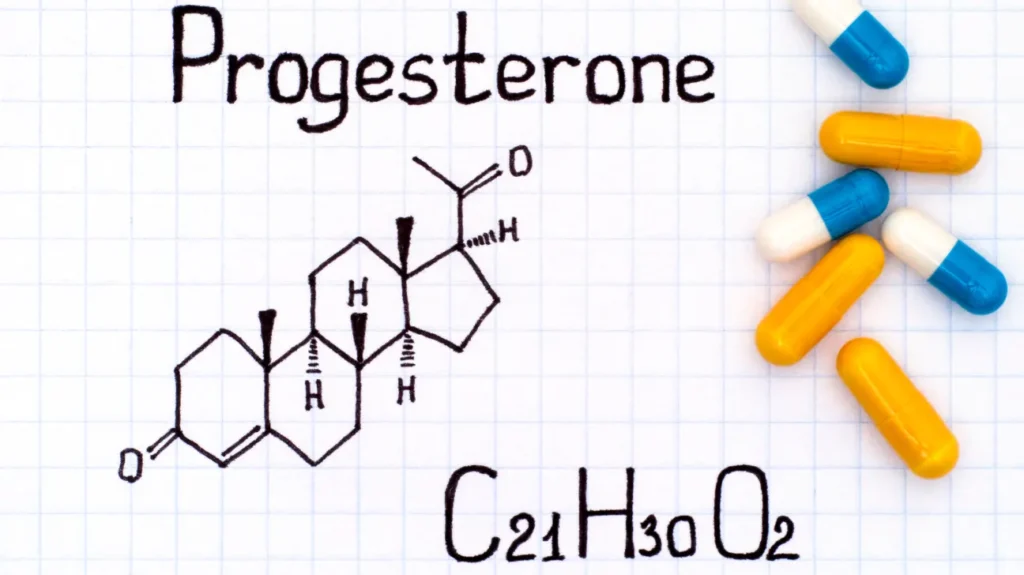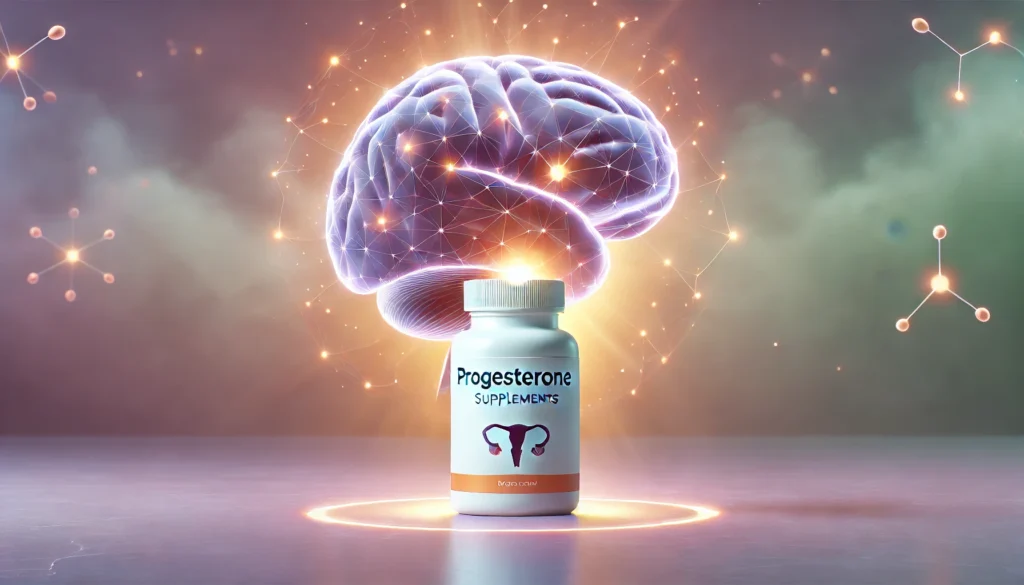Progesterone, a steroid hormone primarily produced in the ovaries, plays a crucial role in the menstrual cycle, pregnancy, and embryogenesis in humans. It also has significant implications for brain function, impacting mood, cognition, and overall mental well-being. Emerging research suggests that progesterone may possess nootropic properties, potentially enhancing cognitive performance and neuroprotection. This article provides a comprehensive overview of progesterone, including its sources, chemistry, physiological mechanisms, potential nootropic benefits, dosing guidelines, side effects, interactions with other substances, and important considerations for its safe use as a supplement.
You May Also Like:
Sources of Progesterone
Progesterone is produced endogenously in the body, primarily in the ovaries during the luteal phase of the menstrual cycle and during pregnancy by the placenta. In addition to its endogenous production, progesterone can also be obtained through synthetic or bioidentical hormone replacement therapies. Common sources include:
- Synthetic Progesterone: Available as a prescription medication, synthetic progesterone (often referred to as progestin) is used to treat various hormonal imbalances, irregular menstrual cycles, and to support pregnancy.
- Bioidentical Hormones: Compounded formulations of bioidentical progesterone are available for individuals seeking hormone replacement therapy, often tailored to individual hormonal profiles.
- Natural Sources: Certain plants, such as wild yam, contain diosgenin, a precursor to progesterone. However, the body cannot convert diosgenin into progesterone effectively, so it does not provide the same hormonal effects as synthetic or bioidentical progesterone.
While dietary sources do not significantly contribute to progesterone levels, maintaining a balanced diet rich in healthy fats and nutrients may support overall hormonal health.
Support Brain Vitality, Mood Stability, and Hormonal Health with Progesterone—Shop Amazon’s Best!

Chemistry of Progesterone
Progesterone (chemical formula: C21H30O2) is classified as a progestogen, a type of steroid hormone. Its structure consists of a steroid backbone, characterized by four fused carbon rings, with a ketone group and a double bond in its structure. This specific arrangement allows progesterone to bind to its receptors—primarily the progesterone receptor (PR) in target tissues, including the brain.
Once synthesized, progesterone is released into the bloodstream, where it exerts various physiological effects. It is transported in the circulation bound to carrier proteins, including sex hormone-binding globulin (SHBG) and albumin. The hormone is metabolized primarily in the liver, where it is converted into various metabolites, including allopregnanolone, a neuroactive steroid that contributes to its cognitive and mood-modulating effects.

Physiological Mechanisms of Progesterone in the Body and Brain
Progesterone has diverse physiological roles, particularly in reproductive health. However, its actions extend to the central nervous system (CNS), where it influences various neurotransmitter systems, promotes neurogenesis, and exhibits neuroprotective effects.
- Neurotransmitter Modulation: Progesterone modulates the activity of gamma-aminobutyric acid (GABA), the primary inhibitory neurotransmitter in the brain. By enhancing GABAergic activity, progesterone promotes relaxation and may alleviate anxiety, contributing to improved cognitive function.
- Neuroprotection: Progesterone has demonstrated neuroprotective properties, particularly following traumatic brain injury or stroke. It aids in reducing inflammation and oxidative stress in neural tissues, facilitating recovery and preserving cognitive function. This neuroprotective mechanism may be attributed to its ability to inhibit apoptotic pathways and promote cell survival.
- Neurogenesis: Emerging evidence suggests that progesterone may enhance neurogenesis, the process of generating new neurons from neural stem cells. This effect is particularly relevant in the hippocampus, a brain region critical for learning and memory. By stimulating the proliferation of neural progenitor cells, progesterone may enhance cognitive performance and protect against age-related cognitive decline.
- Mood Regulation: Due to its influence on GABA and other neurotransmitters, progesterone may play a role in mood regulation. Fluctuations in progesterone levels are linked to premenstrual syndrome (PMS) and postpartum depression, indicating its potential impact on emotional well-being.
Nurture Brain Health, Improve Mood, and Balance Hormones with Progesterone—Available on Amazon!

Nootropic Benefits of Progesterone
Given its multifaceted roles in brain health, progesterone is being explored as a nootropic supplement. While research is still emerging, the following potential benefits have been identified:
- Cognitive Enhancement: By modulating neurotransmitter systems and promoting neurogenesis, progesterone may enhance cognitive functions such as memory, attention, and learning. Some studies indicate that hormonal fluctuations during the menstrual cycle may correlate with variations in cognitive performance, suggesting that progesterone may support optimal brain function.
- Mood Stabilization: Progesterone’s anxiolytic properties may help stabilize mood and alleviate symptoms of anxiety and depression. This mood-regulating effect may contribute to improved cognitive clarity, as emotional distress can hinder cognitive processes.
- Neuroprotective Effects: The neuroprotective benefits of progesterone are particularly relevant in protecting against cognitive decline associated with aging or neurodegenerative diseases. By reducing inflammation and oxidative stress, progesterone may help preserve neuronal integrity and function over time.
- Potential Benefits in Menopause: In postmenopausal women, the decline in progesterone levels is associated with cognitive changes and mood disturbances. Hormone replacement therapy (HRT) that includes progesterone may mitigate these effects, supporting cognitive health and emotional stability during menopause.

Dosage and Supplementation Guidelines
Progesterone supplementation should be approached cautiously and ideally under the guidance of a healthcare professional. The dosage may vary depending on the individual’s health status, hormonal balance, and specific needs.
- Typical Dosages: For individuals seeking progesterone for hormonal balance or mood support, common dosages range from 100 to 400 mg per day, administered in various forms, including capsules, creams, or injections. The specific dosage should be tailored to individual requirements and monitored by a healthcare provider.
- Timing of Administration: The timing of progesterone supplementation can also influence its efficacy. For example, administering progesterone at night may enhance its calming effects, making it a suitable option for individuals experiencing sleep disturbances.
- Forms of Supplementation: Progesterone is available in several formulations, including oral capsules, transdermal creams, and injectable forms. Transdermal delivery may offer more stable hormone levels and reduce gastrointestinal side effects.
- Hormone Replacement Therapy: In cases of hormonal deficiency, particularly in perimenopausal or menopausal women, progesterone may be part of a comprehensive hormone replacement therapy plan, often combined with estrogen.
Progesterone for Hormonal Balance, Mental Clarity, and Overall Health—Find Top Picks on Amazon!

Side Effects and Safety
While progesterone is generally considered safe when used appropriately, potential side effects and safety considerations should be acknowledged:
- Common Side Effects: Mild side effects of progesterone supplementation may include fatigue, dizziness, headaches, mood swings, and gastrointestinal disturbances. These effects often subside as the body adjusts to the hormone.
- Risk of Hormonal Imbalance: Overuse or inappropriate dosing of progesterone may lead to hormonal imbalances, potentially exacerbating symptoms of estrogen dominance, such as bloating, weight gain, and mood changes.
- Cardiovascular Risks: Some studies suggest that long-term use of hormonal therapies, including progesterone, may be associated with increased risks of cardiovascular events, particularly in women with pre-existing conditions. It is essential for individuals to discuss their cardiovascular health with a healthcare provider before starting progesterone supplementation.
- Contraindications: Progesterone should be used with caution in individuals with certain health conditions, such as liver disease, hormone-sensitive cancers, or a history of blood clots. Comprehensive medical evaluations are crucial to determine the appropriateness of progesterone supplementation.
Interactions with Other Supplements and Medications
Progesterone may interact with various medications and supplements, which could influence its efficacy and safety profile:
- Hormonal Contraceptives: Co-administration of progesterone with other hormonal contraceptives may lead to hormonal imbalances. It is crucial to consult a healthcare provider to evaluate potential interactions.
- Sedatives and CNS Depressants: Progesterone’s calming effects may be potentiated when taken with other sedative medications or substances, such as benzodiazepines or alcohol, leading to excessive sedation and impairment.
- Antidepressants: Some research suggests that progesterone may interact with certain antidepressants, either enhancing or diminishing their effects. Close monitoring by a healthcare provider is essential for individuals on antidepressant therapy.
- Anticoagulants: Hormonal therapies, including progesterone, may influence blood coagulation pathways. Individuals taking anticoagulants should consult their healthcare provider to ensure safe concurrent use.
Risks for Individuals with Certain Health Conditions
While progesterone supplementation may benefit many individuals, it is not suitable for everyone, particularly those with specific health conditions:
- Hormone-Sensitive Conditions: Individuals with hormone-sensitive cancers (such as breast or endometrial cancer) should avoid progesterone supplementation, as it may stimulate tumor growth.
- Liver Disease: Since progesterone is metabolized in the liver, individuals with liver disease should exercise caution and consult a healthcare provider before starting progesterone therapy.
- Cardiovascular Disorders: Individuals with a history of cardiovascular issues should carefully assess the risks and benefits of progesterone supplementation, as hormonal therapies may influence cardiovascular health.
Progesterone for Cognitive Support, Mood Balance, and Hormonal Health—Shop Now on Amazon!

Should You Consider Progesterone as a Nootropic?
Progesterone’s multifaceted role in the body, particularly its influence on brain function and mood, positions it as a potential nootropic supplement. Having said that, its ability to modulate neurotransmitter activity, promote neuroprotection, and enhance cognitive function warrants further exploration in clinical settings. As with any supplement, it is essential to approach progesterone supplementation with caution and under the supervision of a qualified healthcare professional. While the potential nootropic benefits of progesterone are promising, individual responses can vary significantly due to factors such as hormonal balance, underlying health conditions, and concurrent medications.
Users should be aware of the possible side effects and interactions associated with progesterone and should prioritize comprehensive health evaluations to ensure its safe use. Ultimately, understanding the full scope of progesterone’s effects on cognition and mental well-being requires more extensive research. As science advances, progesterone may emerge as a valuable tool in cognitive enhancement and emotional stability, particularly for those facing hormonal imbalances or cognitive decline.

References:
- Progesterone. Retrieved from: https://my.clevelandclinic.org/health/body/24562-progesterone
- Progesterone and neuroprotection. Retrieved from: https://www.sciencedirect.com/science/article/abs/pii/S0018506X12001687
- Progesterone Effects in the Nervous System. Retrieved from: https://anatomypubs.onlinelibrary.wiley.com/doi/full/10.1002/ar.24121
Important Note: The information contained in this article is for general informational purposes only, and should not be construed as health or medical advice, nor is it intended to diagnose, prevent, treat, or cure any disease or health condition. Before embarking on any diet, fitness regimen, or program of nutritional supplementation, it is advisable to consult your healthcare professional in order to determine its safety and probable efficacy in terms of your individual state of health.
Regarding Nutritional Supplements Or Other Non-Prescription Health Products: If any nutritional supplements or other non-prescription health products are mentioned in the foregoing article, any claims or statements made about them have not been evaluated by the U.S. Food and Drug Administration, and such nutritional supplements or other health products are not intended to diagnose, treat, cure, or prevent any disease.


